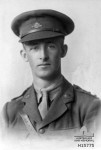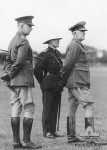ANDREW, Basil John
Basil John Andrew was born in East Melbourne and went to school at Scotch College, Launceston. While at school, he trained with both the Junior and Senior Cadets and went on to the Citizen Military Forces. At the time he enlisted, he had completed nearly three years at the Military College, Duntroon. He enlisted on 1 July, 1915, and was appointed to the 12th Battalion, 14th Reinforcements, as a Lieutenant. He embarked for overseas service on the 'Warilda', on 8 February 1916, disembarking at Suez and was taken on strength at Serapeum with the 12th Battalion on 25 March that year. Four days later, they were transferred from Alexandria to join the British Expeditionary Force at Marseilles, France. On 1/6/1916, he was transferred to the 3rd Infantry Battalion Headquarters and appointed Acting Staff Captain and, on 14 July, was transferred again, this time to the 2nd Entrenching Battalion as both Adjutant and Quartermaster on a temporary basis following the death in action of of Captain Nicholls. He returned as Commanding Officer to the 12th Battalion in August and in late October ,1916, was promoted to Staff Captain.Here the 12th battalion moved to the Western Front, having their first battle at Pozieres and later in 1916, in Belgium, at the battles of Bullecourt and Messines, at Ypres.
An undated note from 1917, titled Captain B.J.Andrew 12th Battalion (aged 22) says of him "Has done well. Pleasant personality. Clear headed and quick. Quite suitable for Staff Captain and should make Brigade Major very shortly." It was apparent that army authorities admired his capabilities, sending him to Clare College, Cambridge, in 12 February, 1917, to attend a staff course. From here, he returned to France, where he was appointed to the 3rd Australian Infantry Brigade Headquarters as a Staff Captain. He finally resumed regimental duties with the 12th Brigade on 2 October, 1917.
After the fall of Russia in October, 1917, the Germans made a strong counter-attack on the allied lines in Belgium. In March/April 1918, the 12th Brigade was heavily engaged at the battle of Dernancourt, holding their ground but at the cost of 1,230 casualties to the Germans 1,600. After this, one battalion had to be absorbed into the others to make up the numbers. Following an illness, Andrew went on leave in October that year and was awarded a temporary rank of Major. He served until 1919, was sent to Senior Officers School at Aldershot in January 1919, and then returned to Australia. He remained in the army, re-enlisted in World War 2, and died of a coronory occlusion while on active service in Alexandria on 29 April, 1941. He was buried in Plot N, Grave No.158 at the British War Memorial Cemetery, Alexandria.
National Archives of Australia WW2 Enlisments
Australian War Memorial, WW1 Unit History, Photographs
Trove.



